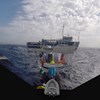documentary
Completed: The worst lie is the documentary – what role does the subjective documentary film play in a post-truth era?
How can artistic narration, based on subjective perspectives, develop the documentary film? The project will spread knowledge and reach new arenas where artistic research is usually not portrayed.

Forensic Art and Documentary Film as Non-Governmental Rights Campaigns: Possibilities and Limitations
This project consists of three research-initiation workshops on aspects of a unifying theme: forensics in art and documentary film.

Staffan Julén
I am Head of communications at the Institute for Futures Studies, documentary film director and producer. At the institute I have among other things been working on a research project financed by the where I examined how artistic subjective narration can develop the documentary film.
Movie premiere! A New Society
Why do we need social progress? On July of 2014 a monumental task began as hundreds of the world's leading academics came together to set new standards for a just, secure and healthy global society. T has been tirelessly forming a non-partisan report addressed to all social actors, movements, organizations, politicians, and decision-makers in order to provide an architecture for present and future global issues and crises.
The knowledge-management complex: From quality registries to national knowledge-driven management in Swedish health care governance
Politics & Policy Abstract This article analyzes the emergence of the Swedish “national system for knowledge-driven management.” We argue that the system is best understood as a meta-instrument that
Archives of/as resistance: On the justice potential of eyewitness image records documenting the Syrian conflict
Media, Culture & Society Abstract What are the new possibilities of enacting justice through the vast archives of digital eyewitness images and self-representations produced since 2011 by the grassr

Sakli(g)t 2024: Sveriges första sakprosafestival
Sakli(g)t is Sweden's first festival of literary non-fiction, organized by the Rikstolvan cultural centre outside Simrishamn in collaboration with the Institute for Futures Studies and Linnaeus UniverGiven the central role of non-fiction as a knowledge-transmitting link between science and the public, Sweden needs an arena where the narrative non-fiction book is the focus of in-depth discussions on the politically increasingly hot issues of facts, truth, narrative, reality and how form and aesthetics affect both knowledge itself and what knowledge becomes viable in today's technologically mobile media landscape. Such meeting places for producers and consumers of the documentary genre have long existed in the neighboring Nordic countries, but have not yet existed in Sweden.This year's program includes author talks with Åsa Wikforss, Nicolas Lunabba, Saga Cavallin, Johan Hilton, Lyra Ekström Lindbäck, Gudrun Schyman, Lasse Berg and Elena Kostiutjenko. In total, 50 authors will appear at the festival. Read the . Get .Together with Rikstolvan, the Institute is a co-founder of the festival, which was launched last year. A permanent establishment of the festival has been made possible with funds from the Institute for Futures Studies, Linnaeus University, the Nature & Culture Foundation, the Swedish Academy, the Swedish Arts Council, Simrishamn Municipality and Region Skåne.
Completed: Waiting for Life
A minitour with screening of the film "Waiting for Life" and a panel discussion including three former life-sentenced men, two criminologists and a documentary filmmaker will be made in San Fransisco, Washington DC and Stockholm. How can culture and meaningful content change life in prison?

Kari Andén-Papadopoulos
I am a Professor in Media and Communication Studies at the Department of Media Studies, Stockholm university. My research broadly concerns the role of news and documentary images and image practices i

International Panel on Social Progress (IPSP)
Many wealthy societies face challenges and developing countries tend to attempt to imitate their solutions in order to end poverty and hardships instead of finding new models. Can we hope for a better society in the future?








